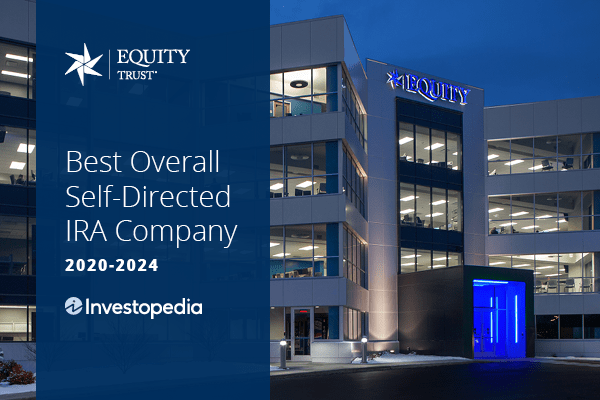Nearly Limitless Options
in One IRA
Invest in both traditional and alternative assets with a single custodian – ready to go beyond a self-directed IRA?
The growing popularity of self-directed IRAs has increased the number of custodians, administrators, and promoters offering self-directed investing options. As more self-directed IRA providers fill the marketplace, it is more important for you to research potential providers to be certain you have the utmost confidence in the handling of your account. It is also important that you understand what you should know, look for, and ask of any potential self-directed IRA provider before investing.
All IRAs must be held by a custodial entity such as a bank, credit union, trust company, or an entity that is licensed and regulated by the IRS as a “non-bank custodian.”
“An individual retirement account is a trust or custodial account set up in the United States for the exclusive benefit of you or your beneficiaries. The account is created by a written document. The document must show that the account meets all of the following requirements.
The trustee or custodian must be a bank, a federally insured credit union, a savings and loan association, or an entity approved by the IRS to act as trustee or custodian…”
–Source: IRS Publication 590
The IRS website publishes a list of nonbank custodians. However, this IRS resource is not a complete list of every custodian. The IRS list does not include entities that qualify as an IRA custodian under state law, which includes Equity Trust.
The South Dakota Division of Banking regulates Equity Trust, and we are registered as a trust company that can custody retirement assets. See the list of state chartered trust companies in South Dakota.

“In the competitive SDIRA arena, experience counts, and Equity Trust has a lot of it. It has put its hindsight to work in creating a well-rounded offering supported by superior customer service, making it our choice as the best overall SDIRA provider.”
Work with the Best – Get Started NowWhen choosing a self-directed IRA custodian you should be comfortable with their industry experience, knowledge, and customer service.

When selecting a self-directed IRA custodian knowing their industry experience is important to building trust in their services. Your financial future is in the hands of the custodian; you should be cautious if they have limited experience.

Self-directed IRA custodians are considered a directed custodian and therefore do not provide investment advice. However, a competent custodian should have a superior knowledge base of the industry.
The employees, from sales and marketing to client service and operations, should reflect this knowledge. The custodian should be able to provide detailed—but easy to read and understand—material on self-directed IRAs that reference authoritative resources.

With any business relationship the quality of service should be a top priority.
From the first contact your interaction with a self-directed IRA provider should be friendly, professional, knowledgeable, efficient, and consistent.
 All custodians charge fees, but what value and service do you receive for those fees? Fee schedules and structures vary between providers and you should beware of firms that are reluctant to discuss fees, that try to “nickel and dime” you, or that have hidden fees. It is important that you understand the fees and how they may be applied to your account.
All custodians charge fees, but what value and service do you receive for those fees? Fee schedules and structures vary between providers and you should beware of firms that are reluctant to discuss fees, that try to “nickel and dime” you, or that have hidden fees. It is important that you understand the fees and how they may be applied to your account.
IRA custodians must adhere to the IRS requirements to have the authority to hold title to the assets, investments, or properties of their clients. Custodians must meet all obligations to be allowed to issue funds, including writing checks and issuing wires for account funds. Additionally, custodians must allow for oversight and requirements for audits by regulatory bodies.
Self-directed IRA administrators and promoters are different from custodians and are limited in the services they can offer. These firms do not meet the IRS requirements to be a custodian or trust and cannot hold title to assets or issue funds.
Administrators or promoters are only responsible for marketing and selling, data entry, producing statements, and basic reporting. To complete transactions a self-directed IRA administrator must establish a relationship with a self-directed IRA custodian or trust that is allowed to hold IRA funds and investments.
An administrator or promoter must pass investor funds to and from a custodian to complete transactions. With little required oversight for self-directed IRA administrators and promoters, having an extra step to pass funds back and forth could be risky for investors.
Custodial Experience
Self-Directed IRA Knowledge
Customer Service
Value for Services

Let’s talk about your financial future.
Schedule a one-on-one session with an expert alternative investment counselor. We’re here to answer any questions, help guide you through the process, and provide more detailed information and education specific to your journey.
By entering your information and clicking Start a Conversation, you consent to receive reoccurring automated marketing emails about Equity Trust’s products and services. This consent is not required to obtain products and services. If you do not consent to receive emails from Equity Trust and seek information, contact us at 855-233-4382.
You are leaving trustetc.com to enter the ETC Brokerage Services (Member FINRA/SIPC) website (etcbrokerage.com), the registered broker-dealer affiliate of Equity Trust Company. ETC Brokerage Services provides access to brokerage and investment products which ARE NOT FDIC insured. ETC Brokerage does not provide investment advice or recommendations as to any investment. All investments are selected and made solely by self-directed account owners.
Continue